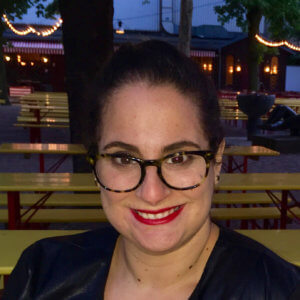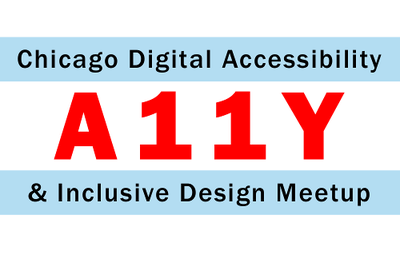Schedule at a Glance
All presentation sessions will take place main venue area. Lunch will be in the dining area on the opposite side of the floor.
As soon as we begin confirming speakers and their presentations, we will update the schedule below. Stay up-to-date by signing up for email updates.
| Start Time | End Time | Session Topic |
|---|---|---|
| 8:00 a.m. | 8:45 a.m. | Registration |
| 8:45 a.m. | 9:00 a.m. | Opening remarks |
| 9:00 a.m. | 9:45 a.m. | Accessibility as a Driver for Design |
| 10:00 a.m. | 10:45 a.m. | The Dyslexic Code |
| 11:00 a.m. | 11:45 a.m. | #SUX: Some User Experience |
| 12:00 p.m. | 1:00 p.m. | Lunch break |
| 1:00 p.m. | 1:45 p.m. | Understanding ARIA 1.1 and the ARIA Authoring Practices Guide |
| 2:00 p.m. | 2:45 p.m. | Straws and Straw Men: The Costly Argument Against Accessibility |
| 3:00 p.m. | 3:45 p.m. | Including people with disabilities in the process |
| 4:00 p.m. | 4:45 p.m. | A Practical Guide to Common A11y Challenges for Developers |
| 4:45 p.m. | 5:00 p.m. | Closing remarks |
Session Details

Presenter: Molly Lee
9:00 a.m. – Accessibility as a Driver for Design
Session description: When content producers started to roll out default captions on videos, they noticed a spike in engagement. A once hard to find practice has becoming a universal standard. With high contrast designs on the rise, and decorative elements falling out of fashion, has accessibility already shifted the design paradigm? As users become more accustom to seeing inclusive features, the higher the demand for them is across all the board. These patterns confirm: accessible design is simply good design.
This talk will take a look at how designers can not only adhere to the WCAG but to think about accessibility as a design principle in its own right.

Presenter: Jeannette Washington, M.Ed.
10:00 a.m. – The Dyslexic Code
Session description: A high incident of dyslexia or dyslexia traits are found in computer programmers. With that in mind, let’s steer the strengths, park the misconceptions and navigate the tech hacks meant to empower developers and designers who exhibit special abilities.

Presenter: Billy Gregory
11:00 a.m. – #SUX: Some User Experience
Session description: In this fun and informative talk, Billy Gregory will examine design trends and accepted best practices that fail to incorporate the needs to all users. When designs only cater to a particular user set, they are shortsighted and not inclusive. In our race to be“sexy” and “modern” we forgot to be usable. For many users, this #SUX.

Presenter: Jon Gunderson
1:00 p.m. – Understanding ARIA 1.1 and the ARIA Authoring Practices Guide
Session description: Understanding the how the roles, properties and states defined in the W3C Accessible Rich Internet Accessibility (ARIA) 1.1 specifications is used by assistive technologies (e.g. screen readers) is critical for accessibility professionals to evaluate and provide guidance on how to identify and remediate web accessibility issues of online resources. ARIA technology is often not well understood by designers and developers as evidenced by high percentage of the ARIA found on the web not properly implemented and often times diminishing, rather than enhancing the accessibility of a web resource. The purpose of this workshop is to help participants understand how ARIA is designed to support the creation of accessible web resources that are work with a wide range of browsers and assistive technologies.
An outline of the ARIA concepts that will be covered in the workshop:
- Concepts of role, properties and states
- How screen readers support ARIA markup
- Standardized mapping of ARIA and HTML5 semantics to accessibility APIs
- Accessible name calculation
- Accessible description calculation
- Keyboard navigation
- Keyboard focus styling techniques

Presenter: Sharlene King
2:00 p.m. – Straws and Straw Men: The Costly Argument Against Accessibility
Session description: It’s easy to make the human and decency argument for inclusive design or efforts, but it’s much harder to make the business case for it. Prejudice, bureaucracy, and unfamiliarity are factors that add to the difficulty rallying an organization to be better. Whether we agree with it or not, factoring in cost or profitability makes a big difference when making the case for accessibility. We’ll examine business cases that show the loss or increase of profits from ignoring or including accessibility. We’ll also talk about how these tactics can be applied. This talk will help you figure out and learn what stakeholders and organizations need to make that change.

Presenter: Liz Davis
3:00 p.m. – Including people with disabilities in the process
Session description: Inclusive design is often daunting. You may feel excited but also overwhelmed with the task of making an experience usable for all. After all, how can we think of everything? We can strengthen our inclusive design empathy by leveraging the knowledge of those living the experience everyday. Connecting and listening to the disabled community is a huge advantage for making your experience inclusive.

Presenter: Melanie Sumner
4:00 p.m. – A Practical Guide to Common Accessibility Challenges for Developers
Session description: Melanie will talk us through the common patterns developers may be asked to implement, review the things to consider and walk through potential solutions.
